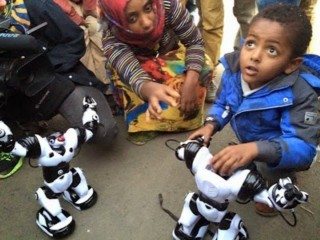
1 – What Emotions Do We Want Robots to Show?
Humanity has the Turing test to evaluate whether humans can distinguish conversing with a machine versus a human, and a machine seems to have been partially triumphant in a June 2014 Turing Competition at the Royal Society. We have the Ada Lovelace test, which is meant to evaluate a computer’s creativity i.e. the person who designed a program must not be able to immediately discern how a machine produces its creative works. In August, a panel of scientists at a Robotronica 2015 conference discussed the sorts of emotions that we may want machines to express. This led the article’s Author David Lovell to wonder, is time for another test? How about the Frampton Test, after rock legend Peter Frampton, in which a machine has to give a convincing and emotionally-appropriate test that also stimulates emotional responses in most humans?
Read the full article on (Phys.org)
2 – Helping the Blind Navigate the Physical World – There’s an App for That
Of the estimated 285 million people worldwide who are visually impaired, 39 million are blind and 246 have low vision, according to numbers released from the World Health Organization. About 90% of those with low vision are also low income. A new startup company is aiming to bring a double solution with the development of an affordable app that helps the visually impaired to see. Aipoly!, a company fresh out of Silicon’s Singularity University , has developed a deep learning algorithm that recognizes a library of objects. The app not only identifies an object, but also places it in context i.e. its action or place in relation to other surrounding objects. The recognition time of less than a minute may be ‘slow’ compared to the human eye, but further funding will help to reduce this response time. Future applications could also exist in robotics.
Read the full article on (IEET)
3 – Facebook’s “M” Virtual Assistant Uses AI and Humans to Operate
Facebook has officially launched “M”, its version of a text-based virtual assistant that is integrated with Facebook and relies on the use of both humans and AI to fulfill requests. While the AI attempts to assist first, humans step in when a request is given that the AI can’t answer. M has more capabilities than past rivals, allowing people to get recommendations on vacations, for example, and then making the actual booking or purchase. The assistant can even hold a spot in the phone queue of a cable company, though this may expand to other service companies in the future – and serve as one way for the technology to generate funds. The service is currently only available to residents of the California Bay area, to ensure commonality between M trainers and users making requests, but the company plans to roll out the product to all Messenger users soon.
Read the full article on (Appleinsider)
4 – Amazon Brings Big Data AI to Europe
Amazon is bringing its big-data-crunching platform to developers in Europe, and also hiring research teams in New York and Berlin that specialize in programming machine functions like making sales predictions and recognizing fraud i.e. advanced pattern recognition. Amazon already uses machine-learning algorithms to automatically predict millions of product prices and forecasting search recommendations. Companies can use this platform, with or without being members of Amazon’s cloud service, as a collection of visualization tools and wizards that allow nontechnical users to create predictions based on their business’ historical data.
Read the full article on (The Wall Street Journal)
5 – Ethiopia’s iCog Labs Seeds AI Amidst a Grim Economy
Ethiopia might seem one of the last places to find an emerging technology industry, but a local company – iCog Labs – is working for global customers and changing that assumption. The burgeoning AI industry in the country’s capital, Addis Ababa, has been helped by its government’s multi-billion investment and high-tech plans, as well as development of higher education to grow these arenas. The capital currently hosts about 30 polytechnics and 30 universities, most specializing in technology. iCog Labs was co-founded in 2012 by an Ethiopian roboticist, Getnet Aseffa Gezaw, and American AI Pioneer Ben Goertzel. Now, with a team of 25 Ethiopian software engineers, iCog pursues ‘strong intelligence’ software, the theory that computers can mimic – and push the limits – of the entire human brain. The lab also focuses on practically applications for global clients, such as humanoid robots for Hanson Robotics, AI-driven automated pill dispensers and elder-care robots for China’s Telehealth, and mapping the genetics of longevity for two California-based corporations, Age Reversal Inc. and Stevia First. The company is also developing software for AI tables for local Ethiopian children, with games that promote self-learning in elementary coding, mathematics, and English.
Read the full article on (HuffPost Tech)







